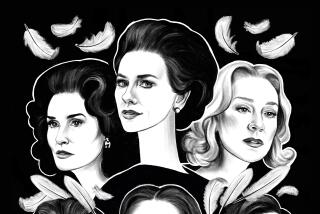Midnight Snack at Tiffany’s : ANSWERED PRAYERS The Unfinished Novel <i> by Truman Capote (Random House Inc.: $16.95; 208 pp.)</i>
- Share via
Whenever I read even a paragraph by Truman Capote, I want to grab every writer alive and say, “Look--here is how it’s done.” Capote’s work is irresistible; the sheer pleasure of his sentences and the intoxication of his stories are often held against him, as if accessible, exciting prose were a mark of shallowness, of empty skill. And now we have “Answered Prayers,” his final work, the three existing chapters of his unfinished novel.
Capote began work on “Answered Prayers” in 1966, at the dizzy height of the acclaim for “In Cold Blood,” his nonfiction novel of Midwestern murder that sold more than 5 million copies and loitered on the best-seller list for 37 weeks. Capote, according to an introduction by his editor, Joseph M. Fox, received substantial advances for “Answered Prayers,” with his book contract renewed almost yearly until 1981. It was in 1976 that Capote published excerpts from “Answered Prayers” in Esquire; the chapters, often using the names of real-life notables, promised a Proustian view of international high society, a tell-all account of the Kennedys, sexual barter in the literary world and fragrant, addictive gossip at La Cote Basque, an elegant bistro then serving as Manhattan’s social hub.
When these early chapters appeared, an uproar ensued. Virtually all of Capote’s well-placed friends disowned him. Doors slammed; he had betrayed his platinum hosts and hostesses. Capote claimed to be nonplussed by this savage response; “What did they expect?” he said. “I’m a writer, and I use everything. Did all those people think I was there just to entertain them?”
From this point onward, Capote’s life became a downward spiral of drugs and alcohol, of slurred speech and public embarrassments, ending with his death in 1984. At various times, he claimed to have finished “Answered Prayers”; to date no manuscript has been found. While rumors abound, Capote’s editors and biographers feel that he finished little if any of the novel beyond the published three chapters. “Answered Prayers” will most likely remain a fragment, a promise, a teasing glimpse of a larger work.
“Answered Prayers” is narrated by P. B. Jones, a dark fantasy of Capote himself. Jones is a failed author, a drifter making his way via social climbing and prostitution, often indistinguishable activities. Jones, a Mississippi orphan, gets by on his blond good looks and his pansexual prowess; he travels to New York, beginning what he terms “my journey to the Earth’s interior.” Jones first hooks up with Turner Boatwright, the “killer fruit,” a predatory magazine editor. Boatwright passes him along to Alice Lee Langman, a voracious lady novelist, “the queen of the writer-in-residence swindle.”
Jones is soon published in prestigious literary journals and receives grants and a publishing deal. He questions his methods, his bed-hopping and shrewdly aimed flattery. “Is it possible,” he wonders, “to love someone if your first interest is the use you make of him? Doesn’t the gainful motive, and the guilt accruing to it, halt the progress of other motions?”
The jacket photo on Jones’ first collection of short stories attracts the notice of Denham Fouts, an internationally renowned male hustler, “The Best-Kept Boy in the World.” Fouts, the consort of kings and tycoons, mails Jones a first-class ticket aboard the Queen Elizabeth; Jones meets Fouts in Paris where they share a platonic affair, as Fouts is impotent due to opium addiction. Fouts introduces Jones to the metaphorical “Father Flanagan’s All-Night-Nigger-Queen Kosher Cafe,” a haven for outcasts found “at the end of the line, just beyond the garbage dump.”
Jones samples postwar Parisian society, chumming with Cocteau, Camus and Gertrude Stein, the latter impaled as “not at all the brown mother-earth monolith Picasso palmed off, but more of a Diamond Jim Brady personage, a big-bellied show-off.”
Fouts takes the cure at a Swiss clinic; Jones deserts him. Jones cannot find a publisher for his novel and becomes a gigolo, a professional “friend of the rich”; he tours Tangier, meeting the millionairess Barbara Hutton, a bejeweled wraith carried about by a “seven-foot Senegalese in a crimson turban.” La Hutton recommends Jones to the legendary Kate McCloud, whose voluptuous persona enchants the second chapter of “Answered Prayers.”
Jones’ adventures are recounted as entries in a journal kept amid his present-day poverty in a room at a Manhattan YMCA. Jones intersperses his memories with reports of his current employment as a call-boy in the stable of Miss Victoria Self, a Teutonic harridan who runs the Self Service. Among Jones’ clientele is Mr. Wallace, a Southern playwright cruelly reminiscent of Tennessee Williams. Mr. Wallace is an embittered, boozing hypochondriac who “has no friends because the only people he pities are his own characters and himself--everyone else is an audience.” Mr. Wallace seems less a portrait of Williams than a distillation of Capote’s terrors for his own waning years.
“Kate McCloud,” the second chapter of “Answered Prayers,” records Jones’ pairing with Kate, the “goddess of the fashion press.” Jones becomes Kate’s masseur and paid companion; he finds himself falling in love with her. “It was as if I’d slipped into furious white water, an icy boiling current carrying me, slamming me toward some picturesque but deadly cascade.”
“La Cote Basque” is the novel’s third chapter, primarily a monologue by Lady Ina Coolbirth, “a big breezy peppy broad, born and raised on a ranch in Montana,” who has married into royalty. Lady Coolbirth’s gossip was Capote’s social death certificate; her knowing, profane chatter includes borderline-libelous anecdotes involving Cole Porter, Oona Chaplin, J. D. Salinger and the Bouvier sisters (“a pair of Western geisha girls”). Gloria Vanderbilt and Carol (Mrs. Walter) Matthau banter on a near banquette; Capote adores them as “charmingly incompetent adventuresses.”
Some of the gossip is thinly disguised; the travail of “Ann Hopkins” is based on a actual upper-crust homicide, which also inspired Dominick Dunne’s “The Two Mrs. Grenvilles.” It is said that the publication of “La Cote Basque” drove Ann Hopkins’ real-life counterpart to suicide. Lady Coolbirth begins each morsel with a tempting introduction, such as “Would you care to hear a truly vile story? Really vomitous?” Of course we would.
So what are we left with--idle if delicious scandal? A dissertation on the evils of the seismically rich and power-crazed? Yes, but from the pen of a sorcerer, an author incapable of boring his readers, and certainly a man who knew what he was dishing out.
The escapades of P. B. Jones, while sordid, are lush with the romance of failure, the doomed glamour of gilded hookers and bruised Eurotrash. There is a glee in Capote’s skewering of literary power plays; as with Proust, Capote is in thrall to the social depravity he depicts. He knew that tales of gifted, sexually magnetic losers are far more enticing than any virtuous success story; Satan beats the Boy Scouts every time. Jones, Denham Fouts and Kate McCloud are above all gorgeously romantic figures, asking not for our sympathy but merely our mesmerized attention.
As gossip, “Answered Prayers” delivers; Capote details a drunken evening Jones spends in the company of Dorothy Parker, Tallulah Bankhead, Estelle Winwood and Montgomery Clift; this mad dinner party becomes an uproarious encyclopedia of camp punch lines. Even if the reader is unfamiliar with the blizzard of names being dropped, “Answered Prayers” is worth the ride, as an engrossing and ultimately poignant saga of aristocratic excess.
The title of “Answered Prayers” is plucked from a saying of St. Teresa of Avila: “More tears are shed over answered prayers than unanswered.” Capote’s theme is the despair of getting what you think you want, of life at the sumptuous top; “When you have nothing and when you have everything,” he tells us, “each is an abyss.”
The three chapters of “Answered Prayers” are remarkably complete in themselves and should be cherished as top-flight work from a master; better three unmoored Capote chapters than a shelf-full of novels from lesser talents.
Some will mourn “Answered Prayers” as a testament to Capote’s tragic decline, as an indictment of his publicity-mad, celebrity-infested life. This seems futile; let us celebrate “Answered Prayers,” as a gift from an unbridled genius.
More to Read
Sign up for our Book Club newsletter
Get the latest news, events and more from the Los Angeles Times Book Club, and help us get L.A. reading and talking.
You may occasionally receive promotional content from the Los Angeles Times.






